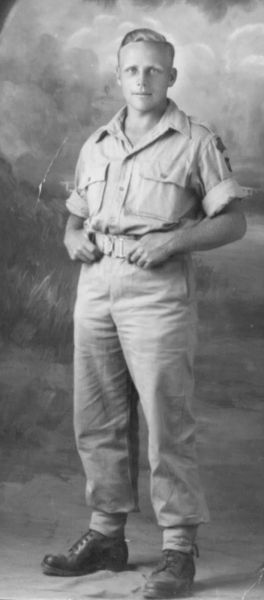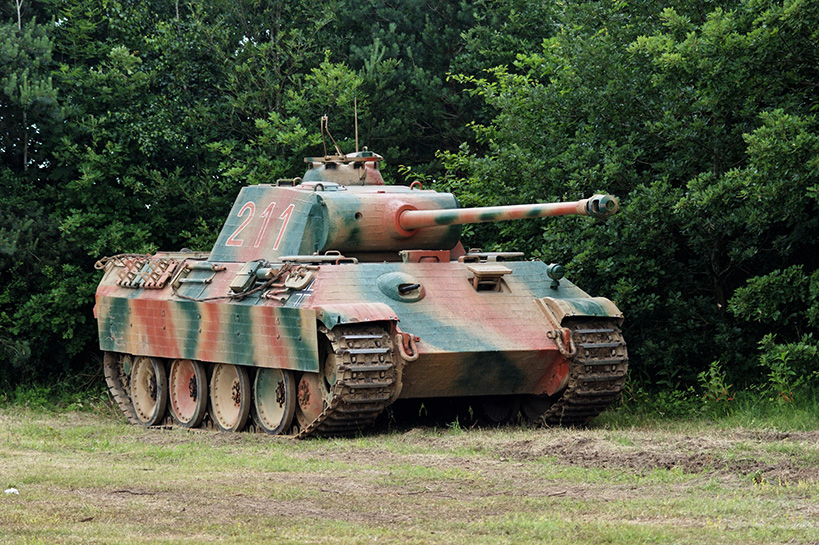Macey, Clifford Norman
- Date of birth:
- November 28th, 1916 (Minnedosa/Manitoba, Canada)
- Date of death:
- February 21st, 2002 (Winnipeg/Manitoba, Canada)
- Service number:
- P.3515
- Nationality:
- Canadian (1931-present, Constitutional Monarchy)
Biography
Do you have more information about this person? Inform us!
- Period:
- Second World War (1939-1945)
- Rank:
- Acting Sergeant
- Unit:
- Reconnaissance Troop, 2nd Armoured Regiment (Lord Strathcona's Horse (Royal Canadians)), 5th Canadian Armoured Brigade, 5th Canadian (Armoured) Division, Canadian Army
- Awarded on:
- August 12th, 1944
On 24 May 1944 a force of all arms based on 2nd Canadian Armoured Regiment (Lord Strathcona's Horse, Royal Canadians) was given the task of pushing through a gap established in the Adolph Hitler Line and capturing a crossing over the River Melfa. A portion of the reconnaissance troop of the regiment [commanded by Lieutenant E.J. Perkins] was ordered to precede the main force and seize a crossing over the River Melfa. Sergeant Macey acted as Troop Sergeant of this detachment. The troop reached the crossing of the River Melfa at approximately 1500 hours and an officer [Perkins] and Sergeant Macey successfully reconnoitred a crossing of the river and then jointly carried out the hazardous task of getting their force of three tanks and 13 men over a very difficult crossing. It was then found necessary to widen the track on the far side. This was done partially with explosives but mainly with pick and shovel by personnel of the party. During this highly hazardous operation, in the course of which the small force was protected only by two Bren gunners, the personal example and leadership of Sergeant Macey were beyond all praise. A party of five, including Lieutenant Perkins and Sergeant Macey, rushed a large house at the top of the bank from an unexpected direction, capturing eight paratroop prisoners including one officer and one Non-Commissioned Officer without loss to themselves. Sergeant Macey then returned over the river to guide "A" Squadron across. It was found that "A" Squadron had suffered heavy casualties and the attempt to get them across was abandoned as overly hazardous. The Reconnaissance Troop was then ordered to hold if possible, pending the arrival of "A" Company, Westminster Regiment (Motor). Until 1700 hours this tiny force of thirteen held the crossing under a constant threat of attack by three Panther tanks which were approximately 600 yards away and which shelled and machine gunned the position frequently.
During this time Sergeant Macey was completely calm and established confidence wherever he went. At approximately 1700 hours the bridgehead was strengthened by the arrival of "A" Company, Westminster Regiment (Motor). Following this the bridgehead was attacked twice by Panther tanks. During both of these attacks Sergeant Macey set an example of coolness by standing up in his reconnaissance tank to fire his .5 Browning at the oncoming Panthers.
During the night the position was heavily shelled by mortars and Nebelwerfers and it was largely due to Sergeant Macey's energy in driving the men, now thoroughly tired, to dig deep slit trenches, which prevented any casualties from this source. In the early morning, the enemy started to threaten a counter-attack. Sergeant Macey although entirely without sleep and under the greatest strain for more than 24 hours, continued to be an example of coolness and leadership until the troop was ordered to withdraw at 1200 hours, 25 May 1944, following a successful attack by the Irish regiment of Canada and the Westminster Regiment (Motor). The qualities of leadership demonstrated by this Non-Commissioned Officer throughout the operation were outstanding. By his example of coolness, cheerful obedience to the orders of his troop officer, and above all by his driving force which overcame all obstacles, he rendered invaluable assistance in the execution of a hazardous and highly successful operation.
The Canada Gazette, 12 August 1944.
Sources
- Photo 1: Christopher Clifford Macey
- - ZUEHLKE, M., The Liri Valley, Douglas & McIntyre Publishers Inc., Vancouver, Canada, 2003.
National Defence and the Canadian Forces
- Legion Magazine
- The Royal Canadian Armoured Corps Association
- Clifford Norman "Chum" Macey (1916-2002) - Find a Grave-gedenkplek




